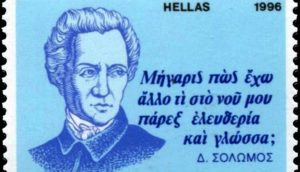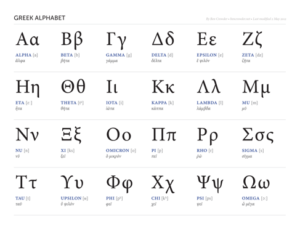In its press release regarding the 2019 International Greek Language Day celebrations, the Ministry of Education writes: “It is important to learn and love the Greek language, because of its virtues but mainly because it has expressed a great culture, that shaped and codified the first and statutory layer of the upper vocabulary and the basic concepts of Western civilization. Over the centuries, its contribution has been decisive as a means of enhancing and spreading Greek culture and today, it is considered as one of the world’s oldest languages”.
The Greek diaspora in Southern Italy campaigned for many years before February 9 was officially established as International Greek Language Day. This day was chosen to coincide with the Commemoration Day of Greece’s ‘national poet’ Dionysios Solomos, whose poem Hymn to Lyberty (Greek: Υμνος εις την Ελευθερίαν) became the National Anthem for both Greece and Cyprus. The poem was written in 1823 inspired by the Greek Revolution that broke out against Ottoman rule in 1821.
Dionysios Solomos state s: Μήγαρις πως έχω άλλο τι στο νου μου πάρεξ ελευθερία και γλώσσα; This translates into: Is there anything else on my mind except freedom and language?
s: Μήγαρις πως έχω άλλο τι στο νου μου πάρεξ ελευθερία και γλώσσα; This translates into: Is there anything else on my mind except freedom and language?
Freedom and language are interconnected or interdependent. They are both important – you cannot choose the one over the other. Without language you cannot express yourself, your thoughts or ideas. This is why the phrase freedom of speech is so important.
Language does not only enable us to communicate with others, but it is also a fundamental part of a person’s identity and culture. It links the past to the present and the future. Language groups people into a nation and into a country.
Greek is the longest of any Indo-European language as it spans 34 centuries. It was the official language in the ancient world right up to the Byzantine Empire. Although today the Greek language is restricted by borders, countless Greek words enrich just about all the world languages. Some say that over 40% of the English language has Greek words or words with Greek roots. Others estimate that more than 150,000 words of English are derived from Greek words. The bottom line is that not only English, but many other languages have Greek words or words with Greek roots.
Greek is the foundational language of Western science, medicine, government, music, the theatre and philosophy as well as the New Testament of the Christian Bible, which is written in Koine Greek (Greek: Κοινή), based on the Attic and related Ionic speech forms. This form of Greek was spoken and written during the Hellenistic period, the Roman Empire and the Byzantine Empire. It was the lingua franca of most of the Mediterranean and Middle East region as a result of the conquests by Alexander the Great.

The Ancient Greeks were the first to use a true alphabet, one that had both vowels and consonants. The word alphabet is formed from the first two letters of the Greek alphabet, ‘alpha’ (a) and ‘beta’ (b). Words such as antique, idol, dialogue, geography, history, grammar etc. are only a few of the Greek words that come from the Greek language. Besides going direct from the Greek into the English, many words became a part of the English language indirectly through Latin and later French. Besides words, there are many expressions from Greek mythology such as Achilles heel, Midas touch, crocodile tears, Pandora’s box, and many more that have become a part of the English language.
Today, Greek is spoken by over 13 million people (in Greece, Cyprus and the Greeks of the diaspora). It is also the official language of two EU member states, Greece and Cyprus and one of the 24 official languages of the European Union. Effort is being made to encourage more people to learn the language. That is why celebrating International Greek Language Day is so important.
 Besides the celebrations that took place in Greece, celebrations took place in many of the countries where Greeks have migrated. In Sydney, the 1st International Greek Language Day took place at the Parliament House of New South Wales on Thursday 8 February 2019.
Besides the celebrations that took place in Greece, celebrations took place in many of the countries where Greeks have migrated. In Sydney, the 1st International Greek Language Day took place at the Parliament House of New South Wales on Thursday 8 February 2019.
The function was organised by the Consul General of Greece in Sydney. It also included the 23rd Hellenic Studies Awards presented by the Australian Hellenic Educators’ Association as well as the award ceremony for the Certificate of Attainment in Greek by the Centre for the Greek Language. In the presence of parliamentarians, Greek language educators, family and friends, Hellenic Studies awardees and successful candidates of the Certificate of Attainment in Greek were presented with their awards and degrees respectively.
This official function for the giving of Greek language awards is not the only one that takes place in Sydney. Other awards are: The Socrates Award for Modern and Ancient Greek at university level; the Kosmas of Aetolia Award for educators that have excelled in the Greek language and the Alexander the Great Award for high school students that have excelled in ancient Greek history. The Greek Community of Sydney over the past 25 years has given the Dionysios Solomos Award to high school students that attend the schools run by the Greek Community that have excelled in Modern Greek and Classical Greek during the Greek Community Festival that is now in its 37th year. The three private Greek Orthodox schools in Sydney also give awards for those students that have excelled in the learning of modern Greek. It must be noted that these awards are not only given to those of Greek descent, but to those of other cultures who are interested in learning the Greek language.
 There are many academics that have written about the contribution of the Greek language to other languages. One such person is Professor George Kanarakis of Charles Sturt University of N.S.W. His book, The Legacy of the Greek Language published in 2017, is a collective volume of thirty-six specialised studies by thirty-five scholars that sets out the unique contribution made by the Greek language from antiquity to the present. The studies extend geographically and culturally beyond the European languages and include Korean, Chinese, Japanese, Afrikaans and Swahili.
There are many academics that have written about the contribution of the Greek language to other languages. One such person is Professor George Kanarakis of Charles Sturt University of N.S.W. His book, The Legacy of the Greek Language published in 2017, is a collective volume of thirty-six specialised studies by thirty-five scholars that sets out the unique contribution made by the Greek language from antiquity to the present. The studies extend geographically and culturally beyond the European languages and include Korean, Chinese, Japanese, Afrikaans and Swahili.

Another academic that acknowledges the importance of the Ancient Greek language and its development into the Modern Greek form that we have today is the Spanish Hellenist, linguistic and translator Francisco Rodriguez Adrados of Madrid’s Complutense University and a member of the Royal Spanish Academy who published the seventh volume of his ‘Spanish Dictionary of the Ancient Greek Language’. He states that Greek is the first language in the world. The Greek language is not only alive in Greece, but has a second life; it’s alphabet, vocabulary, syntax and literature are present in all languages.
 The poet and 1979 Nobel Prize winner in Literature, Odysseas Elytis (Greek: Οδυσσέας Ελύτης) stated: We are the only ones in Europe who have the privilege to call the sky ‘ouranos’ and the sea ‘thalassa’ just like Homer and Plato did more than two thousand years ago.
The poet and 1979 Nobel Prize winner in Literature, Odysseas Elytis (Greek: Οδυσσέας Ελύτης) stated: We are the only ones in Europe who have the privilege to call the sky ‘ouranos’ and the sea ‘thalassa’ just like Homer and Plato did more than two thousand years ago.
He went on to say that the language is not only a means of communication. It carries the psyche of our people, its history and all its kindness.

And of course, the historic and notable speeches made by Xenophon Zolotas, economist, politician and one of the Directors of the Bank of Greece at the International Bank for Reconstruction and Development Conference in 1957 and 1959. As he said: I always wished to address this Assembly in Greek, but realized that it would have been indeed “Greek” to all present in this room. I found out, however, that I could make my address in Greek which would still be English to everybody. With your permission, Mr. Chairman, l shall do it now, using with the exception of articles and prepositions, only Greek words.
A short extract of his speech follows.
In an epoch characterised by monopolies, oligopolies, menopsonies, monopolistic antagonism and polymorphous inelasticities, our policies have to be more orthological. But this should not be metamorphosed into plethorophobia which is endemic among academic economists.
Greek, as the oldest, richest and most diverse language of the world has an important place in all the languages. It is considered to be a difficult language to learn because of its different alphabet, pronunciation of the words and its difficult grammar. However, by celebrating International Greek Language Day on a specific day each year, it will be given the place it deserves on the global scene.